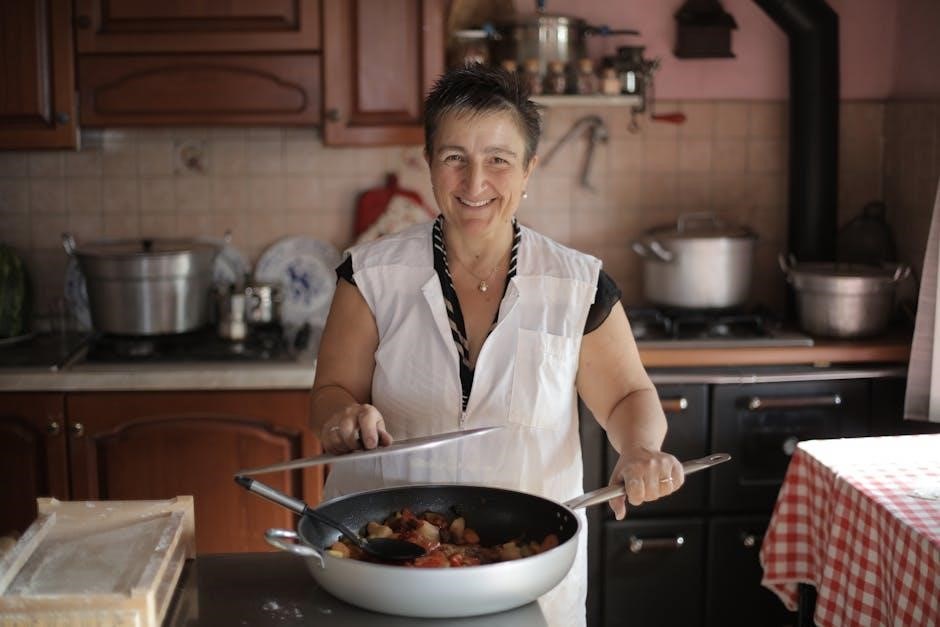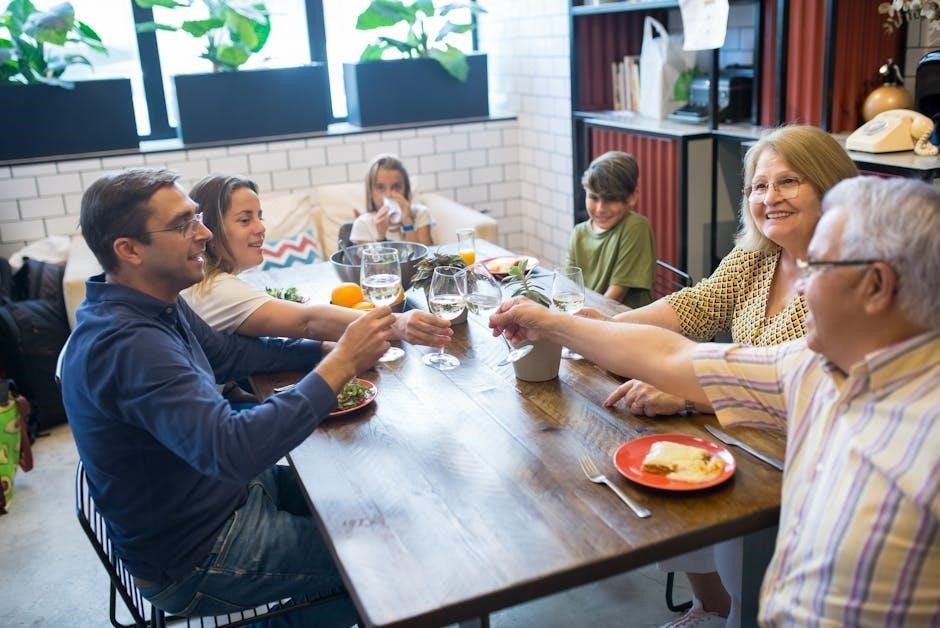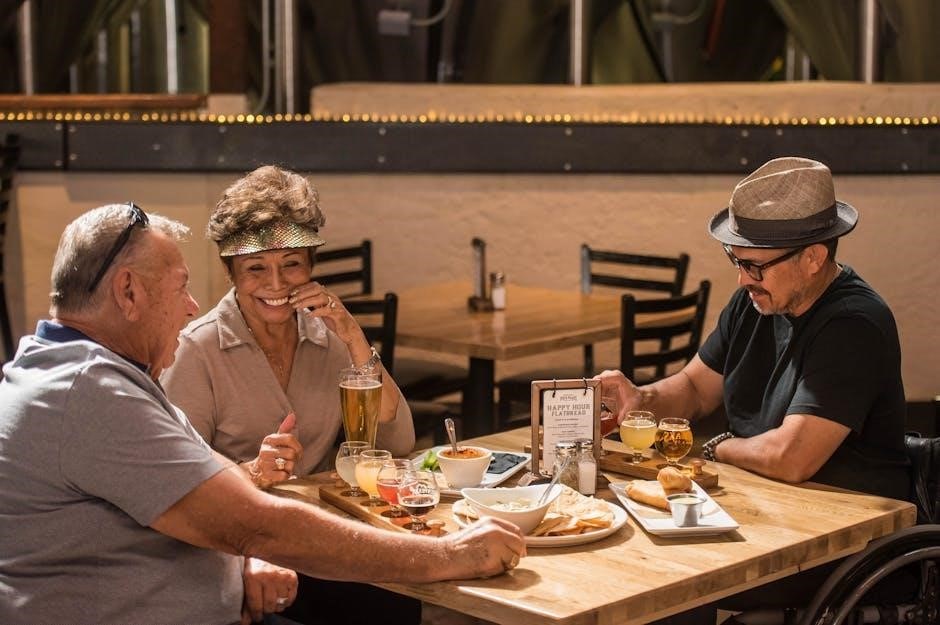Welcome to our guide on senior center lunch menus! These menus are designed to provide nutritious, balanced meals for seniors, promoting health and well-being․ They often include a variety of options to cater to different tastes and dietary needs, ensuring seniors enjoy flavorful and wholesome meals while socializing․ This guide will explore the components, benefits, and accessibility of these menus, helping you understand their importance in the community․

Importance of Senior Centers in the Community
Senior centers play a vital role in fostering community engagement and improving the quality of life for older adults․ They serve as hubs where seniors can access nutritious meals, socialize, and participate in activities that promote physical and mental well-being․ By providing affordable and balanced lunch options, senior centers help address food insecurity and ensure seniors receive essential nutrients for maintaining their health․ Beyond meals, these centers offer resources, workshops, and support services, empowering seniors to stay informed and connected․ They also combat isolation by creating opportunities for interaction, which is crucial for emotional and mental health․ In essence, senior centers are more than just places to eat; they are community pillars that enhance independence, dignity, and overall well-being for older adults․ Their presence strengthens the social fabric, making them indispensable assets to any community․

Overview of Senior Center Lunch Menus
Senior center lunch menus offer a variety of balanced, nutritious meals tailored to seniors’ needs․ They typically include main courses, sides, salads, and desserts, ensuring meals are satisfying and health-focused․ Menus are designed to promote well-being and community engagement, with options available for different dietary requirements․ Lunches are often served weekdays, providing consistency and accessibility for seniors․ These menus are carefully planned to meet nutritional standards while offering flavorful and appealing choices․ They also serve as a way to bring seniors together, fostering social connections and a sense of community․
Components of a Typical Senior Center Lunch Menu

A typical senior center lunch menu is thoughtfully designed to provide balanced and nutritious meals for seniors․ Each meal usually includes a protein source, such as chicken, beef, or fish, accompanied by a variety of vegetables like carrots, green beans, or peas․ Side dishes often feature whole grains, such as rice, pasta, or bread, to ensure adequate fiber intake․ Salads, like mixed greens or fruit salads, are frequently included to add freshness and variety․ Desserts may range from fruit to baked goods, offering a sweet conclusion to the meal․ Beverages, such as milk or juice, are typically served to complement the meal․ Menus are planned to meet seniors’ dietary needs, with attention to calorie, protein, and calcium intake, ensuring meals are both satisfying and health-focused․ Additionally, many centers accommodate special dietary requirements, such as low-sodium or diabetic-friendly options, to cater to diverse needs․ The goal is to provide meals that are not only nutritious but also enjoyable and socially engaging for seniors․

Accessing Senior Center Lunch Menus
Senior center lunch menus are easily accessible online as downloadable PDFs or through direct visits to the center’s website․ Many centers also provide printed copies or allow phone inquiries for menu details․
How to Download Senior Center Lunch Menus in PDF Format

Downloading senior center lunch menus in PDF format is a straightforward process․ Visit the official website of your local senior center and navigate to the “Menus” or “Dining” section․ Look for a link labeled “Download Menu” or “View Monthly Menu․” Many centers provide a direct PDF download option․ If the menu isn’t immediately visible, try searching for “Senior Center Lunch Menu PDF” in the website’s search bar․ Once downloaded, you can print or save the menu for easy reference․ Ensure your device has a PDF viewer installed to open the file․ Some centers may also offer email subscriptions or mobile app access for added convenience․ Always check the website regularly, as menus are typically updated monthly․ If you encounter any issues, contact the center directly for assistance․

Nutritional Considerations for Senior Lunch Menus
Senior center lunch menus prioritize balanced nutrition, focusing on protein, fiber, and essential vitamins․ Meals are designed to support aging health needs, including calcium for bone strength and hydration for overall well-being․ Portion sizes are tailored to meet seniors’ energy requirements while promoting healthy digestion and preventing nutrient deficiencies․
Dietary Restrictions and Special Requirements
Senior center lunch menus often accommodate various dietary restrictions and special requirements, ensuring all participants can enjoy balanced meals․ Common accommodations include vegetarian, gluten-free, and low-sodium options․ Meals are tailored to meet the nutritional needs of seniors, with attention to conditions like diabetes or heart health․ Many centers provide alternatives for religious or cultural dietary preferences․ To ensure proper preparation, seniors are typically asked to notify the center in advance of specific needs; This allows chefs to prepare meals that cater to individual requirements while maintaining flavor and nutritional value․ Additionally, some centers offer delivery services for homebound seniors, ensuring they receive meals that meet their dietary needs․ These accommodations highlight the commitment to inclusivity and accessibility in senior nutrition programs․ By addressing diverse requirements, senior centers promote health and well-being for all participants․ This thoughtful approach ensures everyone can benefit from the lunch program․
Cost and Payment Options for Senior Center Meals
Senior center meals often operate on a suggested donation basis, with fees varying by location․ Many centers offer affordable pricing for seniors, with donations encouraged for those aged 60 and over․ Payment options may include cash, credit, or pre-purchased meal tickets, ensuring accessibility for all participants․

Suggested Donations and Fee Structures
Senior centers typically operate on a suggested donation model, with fees tailored to ensure affordability․ For seniors aged 60 and over, a donation of $5 is often recommended, while those under 60 may be charged a fee, usually around $10; These contributions help sustain the program while keeping meals accessible․ Payment options vary, with many centers accepting cash, credit cards, or pre-purchased meal tickets․ Some centers also offer sliding scale fees based on income or financial need․ Donations are voluntary, ensuring no one is turned away due to inability to pay․ This flexible structure promotes inclusivity and supports the center’s mission to provide nutritious meals for all seniors․ Centers may also provide financial assistance for those in need, further emphasizing their commitment to accessibility and community support․

Benefits of Senior Center Lunch Programs
Senior center lunch programs offer nutritious meals, fostering social interaction and community engagement․ They provide affordable access to balanced diets, promoting health and well-being among seniors while reducing isolation and enhancing overall quality of life․
Social Interaction and Community Engagement

Social interaction is a vital component of senior center lunch programs, fostering connections and reducing loneliness․ Shared meals create opportunities for conversation, friendship, and a sense of belonging․ Many centers host events during lunch, such as guest speakers or activities, to further engage participants․ These gatherings not only provide enjoyment but also encourage seniors to stay active within their community․ For example, some centers offer free lunches with sponsor booths, allowing attendees to learn about local resources and services․ This combination of nutrition and socialization enhances overall well-being, making lunchtime more than just a meal—it’s a chance to build meaningful relationships and stay connected․ By promoting community engagement, senior center lunch programs play a crucial role in enriching the lives of older adults, ensuring they feel valued and supported․